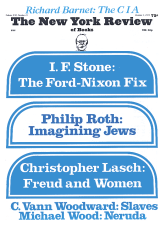To the Editors:
“Is the scholar human?”
With this question Vitali Rubin, a recognized Soviet authority on ancient China, began his “Open Letter to American Sinologists,” which appeared in this publication over eighteen months ago (October 5, 1972). In his letter, Dr. Rubin outlined the events which make this question comprehensible. For three years Rubin had been a senior researcher at the Oriental Institute of the Academy of Sciences in Moscow. In January, 1972, he informed his director that he was going to apply to settle in Israel. By February he had been forced to resign his post. “All my works have since been withdrawn from printing,” he wrote then, explaining that even citations and mentions of his previous works were removed from all books and articles at the printers. His application to emigrate was refused: the official reason given being that as “an important specialist” he was too valuable to lose. “The message is clear,” wrote Dr. Rubin, “such people as I are undesirable, and are to be made nonexistent in Soviet Sinology.”
Since the time of that letter Dr. Rubin’s position has steadily deteriorated. He remains unemployed and has been harassed as a “vagrant” and a “parasite.” In May, 1973, his apartment was searched and his scholarly papers confiscated. In February, 1974, Dr. Rubin, along with two friends in a similar situation, took part in a two-week hunger strike to dramatize his situation.
Over the past eighteen months numerous efforts have been made to assist Dr. Rubin. In January, 1973, Dr. Rubin was invited to teach at Columbia University, but was again denied permission to go abroad. Over 1,300 scholars in the field of Asian studies from nineteen countries signed a petition on Rubin’s behalf which was sent to the USSR Academy of Sciences. To these and many other appeals, there has been no response from the Soviet Union.
Recently Vitali Rubin’s situation has become more urgent. In mid-June he was warned by the KGB that he might be arrested on “parasitism” charges. At the end of that month he was arrested and imprisoned for almost two weeks for attempting to participate in the unofficial scientific seminar of Jewish scholars which was termed a “political provocation” by Soviet authorities. On August 19th Rubin suffered a heart attack. Before his attack Rubin had been working on revisions for an English edition of his book Ideology and Culture in Ancient China which is now being prepared for publication.
It has been difficult to contact Vitali Rubin. In one of the last phone conversations with Rubin in February, he said, “I am already sitting two years…no one knows when I shall be able to leave.” We must not let our colleague lose hope.
We reaffirm our belief that the principle of academic freedom is essential to the highest quality of research and teaching. We deplore the gross violation of this principle in the case of Vitali Rubin and call on Soviet officials to remove immediately the restrictions that have been placed on Dr. Rubin’s work and movement.
L. Carrington Goodrich
Professor Emeritus of Chinese History
Burton Watson
Professor of Chinese
C. Martin Wilbur
Professor of History
and the following faculty members and graduate students of Columbia University: Myron L. Cohen, Gerald Curtis, James L. Nakamura, Steven I. Levine, Carl Riskin, Edwin A. Winckler, Anne Birrell, Irene Bloom, Charlotte Boynton, Mary-Jean Cowell, Carol Gluck, Leslie Lo, J.B. Reardon-Anderson, Agneta Riber, Thomas Rohback, and Ronnie Schaffer
This Issue
October 3, 1974



